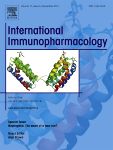

 Home |
Site Map |
Add to Favorites Link |
Send page to a Friend |
Contact us
Home |
Site Map |
Add to Favorites Link |
Send page to a Friend |
Contact us

|

 Home |
Site Map |
Add to Favorites Link |
Send page to a Friend |
Contact us
Home |
Site Map |
Add to Favorites Link |
Send page to a Friend |
Contact us
|
| About Us | Products | Research and Development | Publications and Press | Clinical Trials | Latest News | Contact us |
 |

01/01/2014

Effects of P-MAPA immunomodulator on Toll-like receptor 2, ROS, nitric oxide, MAPKp38 and IKK in PBMC and macrophages from dogs with visceral leishmaniasis
Abstract
Leishmania (L.) chagasi is the etiologic agent of visceral leishmaniasis (VL) that can be transmitted to humans and dogs. VL in Brazil represents a serious public health problem; therefore, it is important to study new alternatives to treat infected dogs. In dogs, the therapeutic arsenal against canine VL is limited.
The immunomodulator protein aggregate magnesium-ammonium phospholinoleate-palmitoleate anhydride (P-MAPA) improves immunocompetence when the immune system is impaired, but its dependence on Toll-like receptors (TLRs) and the mechanisms involved in immune response remain unclear.
The in vitro action of P-MAPA on the expression of TLR2 and TLR4, reactive oxygen species (ROS), nitric oxide (NO) and p38 mitogen-activated protein kinase (p38 MAPK) and IKK phosphorylation was studied in mononuclear cells from peripheral blood and macrophages from healthy and Leishmania-infected dogs. The PBMC or macrophages were isolated and cultured with different concentrations of P-MAPA (20,100 and 200 μg/ml) in a humid environment at 37 °C with 5% CO2.
Observation revealed that Leishmania-infected dogs showed a decrease in TLR2 in macrophages compared with healthy dogs and in induction with P-MAPA. ROS were increased in PBMCs from Leishmania spp.-infected dogs compared with healthy dogs and P-MAPA improved ROS production. NO production was increased in culture supernatant from macrophages stimulated by P-MAPA in both healthy and Leishmania spp. infected dogs.
Treatment of macrophages from healthy dogs with immunomodulatory P-MAPA induced p38 MAPK and IKK phosphorylation, suggesting signal transduction by this pathway. These findings suggest that P-MAPA has potential as a therapeutic drug in the treatment of canine visceral leishmaniasis.
Full article in International Immunopharmacology
Scientific papers about P-MAPA in PubMed


|